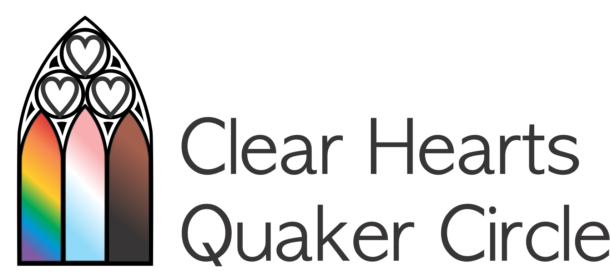Posted on October 13, 2021 by Mark Kille
The Spirit of Worship
Clear Hearts Quaker Circle welcomes posts from our members, attenders, and friends; this is one of that series.
When I was active in Protestant churches with fixed orders of worship, the least interesting and most predictable conversations were about what “real” worship is:
If we don’t have liturgy, there will be no continuity of worship across time and space!
If we have liturgy, there will be no authenticity in the immediate experience of worship!
If we don’t open with songs of praise, we remain focused on ourselves in worship instead of God!
If we open with songs of praise, we can’t center on the still small voice that makes this worship instead of just another busy activity!
Offerings must be collected before communion, to demonstrate our need for repentance and our dependence on God!
Offerings must be collected after communion, to demonstrate our gratitude for the free gift of God’s grace!
There are things that I miss about prepared worship, but there is one thing about unprogrammed Quaker worship that I have found to be a blessed relief. There is no need, or even opportunity, for these unresolvable conversations.
Or at least, that is what I thought — until Quakers began to ask themselves what lessons they had learned from over a year of enforced virtual Meeting for Worship. What had been gained, along with what had been lost? What would we choose to keep, in new forms of hybrid worship, combining the welcome return of physically gathering together with the expanded participation of remote options? For some, the answer has been, “none of it.”
For myself, I can’t imagine Clear Hearts Quaker Circle without hybrid worship, and I am happy that we are in unity about continuing it. As a Christian with a theistic understanding of God, it is natural for me to embrace spiritual connections that are as expansive as possible. I believe that wherever two or three of Jesus’s followers gather, Jesus is there also. I believe the Holy Spirit moves among us in ways we cannot physically perceive. I believe in the Communion of the Saints, the “cloud of witnesses” of those who have gone before us. And I believe, to paraphrase James in the New Testament, that we cannot love God, who we can’t perceive, if we do not love our neighbors, who we do perceive.
I was not surprised to confirm during the pandemic that shared worship is possible with someone who is not in the same physical room. When I have been with Friends on Zoom, they are WITH me. In the future, if someone who is out of town to attend the funeral of a loved one is with me on Zoom, they will be WITH me. If someone with a compromised immune system can’t risk going out during flu season, but they can be with me on Zoom, they will be WITH me. If someone is just weary and doesn’t want to face going out in the world that day, but they can be with me on Zoom, they will be WITH me.
Sometimes we have people join us by Zoom at Clear Hearts, and sometimes we don’t. When we don’t, we still leave Zoom up on the projected screen. I find it meaningful to reflect on the image of our shared virtual space. It reminds me how we must always leave space for the visitor, for the guest to whom we owe the holy duty of hospitality, for by doing so, some have entertained angels unaware.
Similarly, the physical act of passing the microphone, of receiving and returning it, grounds me in the cooperative nature of our shared worship. (At Clear Hearts, we amplify all speech from the time of centering down until the official close of worship. It helps everyone, especially the people who don’t think they need it to understand or be understood by others.)
Of course, the technology is sometimes distracting, but no more distracting than the unexpected sounds, sudden motions or strong smells that are part of the worship environment from time to time. It’s less distracting than my chattering monkey brain or recurring aches and pains. And these days, it’s a lot less distracting than when someone coughs! Allowing distractions to arise and pass is at the heart of mindfulness, the foundational practice of silent worship. There is nothing more “real” about worship than actively engaging with the world and one’s neighbors as they are, instead of as one wishes they might be.
These conversations — these arguments, really — about “real” worship come from an understandable place. So many of us yearn to be part of something with cosmic significance, and when we believe we have found our way to it, we want to share it with others, and we want to protect it. We think we have to protect it so that we can share it. But we can’t share what we aren’t willing or able to release control over.
I am grateful that, at Clear Hearts, we are doing our best to recognize that Spirit does not need our protection in order to do its work. People, on the other hand, frequently do. We all live under the powers of unconstrained capitalism, white supremacy, and patriarchy defined by a coercive gender binary. Contemporary American society assigns us all a measure of worth: we are assets, or we are liabilities. Worship is one time when we should be able to escape the endless demands for “productivity” and “excellence” and “legitimacy.”
These demands always fall hardest on those targeted by our sinful systems: Black, Indigenous, and other People of Color; transgender people; disabled people; impoverished people, houseless people; queer people; women. People with these frequently overlapping and intersecting identities are constantly told their dignity is not real, that their experiences are not real. This is why I will never judge worship practices by whether they are “real,” but rather by whether they allow for justice and inclusion. I feel blessed that these are the conversations I get to have at Clear Hearts.


THIS!!! “I find it meaningful to reflect on the image of our shared virtual space. It reminds me how we must always leave space for the visitor, for the guest to whom we owe the holy duty of hospitality, for by doing so, some have entertained angels unaware.”
AND THIS “This is why I will never judge worship practices by whether they are “real,” but rather by whether they allow for justice and inclusion.”
Speaks my mind. Thank you friend